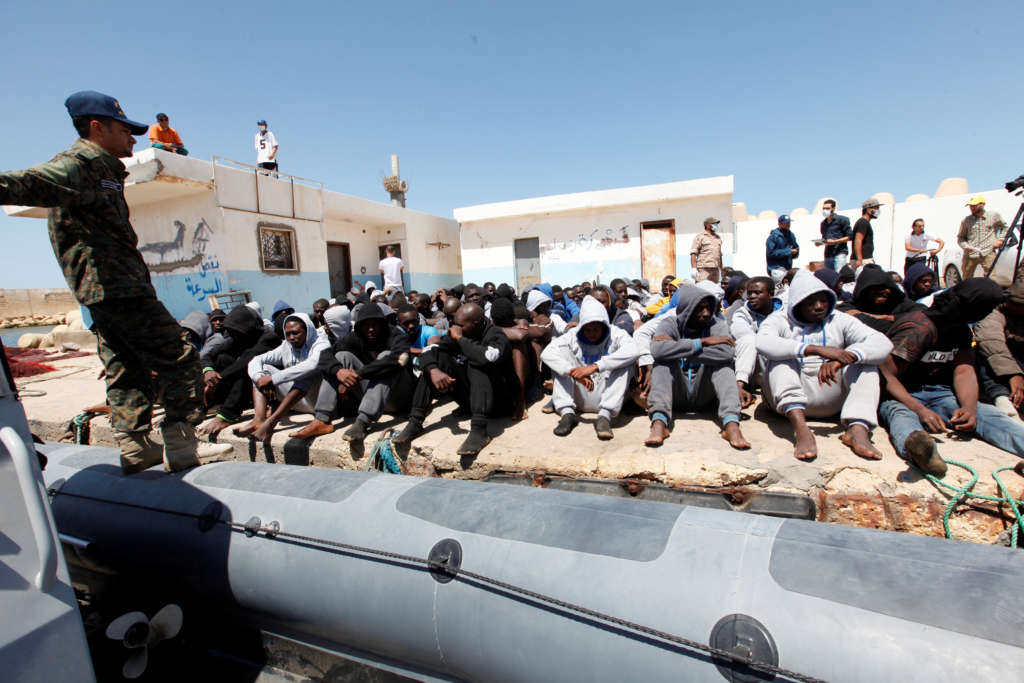Tripoli- When the Libyan coast guard received the first batch of long-awaited patrol boats from Italy in May, two of the four vessels had mechanical problems and the third vessel broke down on its way to Tripoli.
As Italy’s interior minister later flew in to present the boats officially at a naval base in the Libyan capital, coast guards grumbled that the vessels were old and had little deck space for rescued migrants.
“They want us to be Europe’s policeman. At the same time, that policeman needs resources,” said naval coastguard spokesman Ayoub Qassem. “I challenge anyone to work in these conditions.”
Half a million people have crossed the Mediterranean from Libya to Italy over the past four years, mainly sub-Saharan Africans who pay smugglers to shepherd them across the desert to Libya, and onward to Europe in unseaworthy dinghies. An estimated 13,000 of them have drowned.
European governments want to stop the migrants and break the grip of the smugglers. But more than four months after Italy and the European Union launched a new push to tackle the crisis, accounts by migrants, aid workers and officials show that effort is all but failing to make a difference.
When Libyan authorities do catch migrants, they take them to detention centers nominally under the control of the government, which already house about 8,000 people.
Though Europeans have pledged funding to improve the camps, some are still so cramped that migrants have to sleep sitting up.
At Tripoli’s Tariq al-Siqqa migrant center, where visiting dignitaries are brought, flowers have been planted in the courtyard and wash-basins installed. But behind a padlocked metal gate hundreds of migrants still languish, crammed side to side on mattresses in a single unventilated room.
“They shut us up, they imprison us, they ask us for money,” said one 22-year-old from Guinea, who has been in the center since March, when he was intercepted by the Libyan coastguard with about 120 other migrants shortly after they set off for Italy. “They hit people. They don’t like black skin.”
The sea route from the Libyan coast is one of two main routes in the biggest flow of migrants to Europe since World War Two. The other, by sea from Turkey to Greece, was largely shut down last year after an agreement between the EU and Ankara, but the flow from Libya has only increased.
This year has already seen 70,000 people make the journey, with the summer peak season for the voyage only just beginning. An estimated 2,000 have died so far this year.
Unlike Turkey, Libya is still seen as too dangerous for Europeans to send migrants back, so those who make it into international waters usually end up in Italy.
Libya’s people-smuggling networks flourished amid the upheaval that followed the revolution that toppled dictator Muammar al-Gaddafi in 2011, and their trade surged after 2014, when conflict spread and rival governments were set up in Tripoli and the east.
Since 2016, the EU has made a push to cooperate with a new Libyan government backed by the United Nations.
Coastguard training began on board EU ships in October.
In February, Italy signed a memorandum of understanding with Tripoli that the EU quickly endorsed, earmarking 90 million euros.
But Europe has delivered little concrete support, said Tarek Shanbour, a senior coastguard official. “We meet, we talk, we take decisions, we make agreements, but on the ground there is no execution.”
The Libyan government has little sway outside the capital or even over some of the ministries within it. Its authority has been rejected in the east and is barely felt in the south where smugglers bring migrants in across the Sahara.
“So far we can’t say as the European Union we’ve achieved much,” a European official said on condition of anonymity. “The point is we need short term solutions but there are no short-term solutions. There is no Turkey deal in North Africa.”
As European policy makers study longer-term schemes to improve security on Libya’s southern borders, wean communities off smuggling, and provide aid in migrants’ countries of origin, Libyan officials worry that numbers inside Libya will swell.
They say they have little capacity to host migrants in a country deep in economic crisis, where nearly 250,000 are still internally displaced.
European funding has helped increase voluntary repatriations of migrants caught in Libya who agree to return home, but this is unlikely to surpass 10,000 this year.
Migrants caught by the Libyan coastguard at sea or swept up in nighttime raids are detained in migrant centers, both official ones nominally run by the government and others run by an array of armed groups.
Those running the centers raise money by making migrants or their families pay for their release, selling them back to smugglers or hiring them out for labor, migrants say. Sexual abuse is common, according to a former member of staff at one of the Tripoli centers.
In unofficial centers and holding houses in western and southern Libya, run by militias or even by smugglers themselves, conditions are said to be far worse. Migrants say video or audio of them being tortured is relayed to their families to extort cash transfer payments.
Migrants said they were forced to build the center themselves. Several had died from untreated illnesses.
Detention center staff say they lack resources, and sometimes have to use force with desperate or unruly migrants.
Mohamed Bishr, the head of Tripoli’s Department of Combating Illegal Migration (DCIM), dismissed reports of abuse and killings, saying migrants were detained for their protection.
“Given the security situation inside the Libyan state they cannot leave the detention centers because they do not have identification documents,” he said. “They might face the worst if they leave.”
